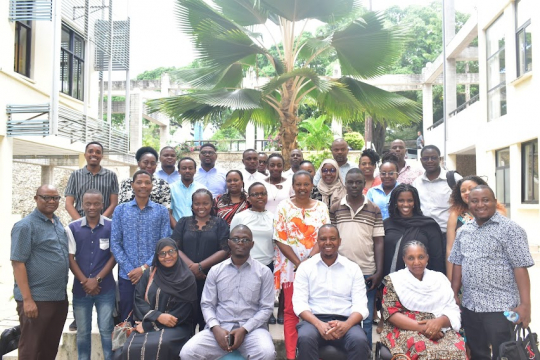A stakeholders' workshop held on 19th August 2022 by EfD Tanzania (EfDT) at the University of Dar es Salaam, School of Economics focused on increasing awareness of the current level of social acceptance in the country through the presentation of a populace survey and collecting new knowledge on social acceptance among stakeholders.
The workshop was attended by over 50 participants from various sectors including the private sector, public sector, civil society organizations, and non-government organizations. Discussions targeted the areas of forest loss, plastic pollution, and fossil fuels. The participants learned that social acceptance of policy transformations in any policy area is a critical issue and that these transformations are likely to be resisted by the public if the level of acceptance is low. Therefore, collecting information on how the general public and stakeholders feel about these reforms and policy instruments used is essential.
General views about policy instruments
During discussions, most of the stakeholders supported the existing as well as the proposed policy instruments used as incentives towards inclusive green economy transformations in fossil fuels, forest loss, and plastic pollution in Tanzania. However, some skepticism was expressed on stringent rules and regulations. For example, one of the participants Mr. Edgar Dadi was against the imposition of carbon taxes on fossil fuels or fuel taxes as it may lead to rising fuel prices and hence inflation which will affect the public welfare negatively. The main reason for this is that developing countries are heavily dependent on fossil fuels and that the use of alternative energy sources is limited. Moreover, the idea of completely banning the use of charcoal was challenged by the fact that it’s the main source of energy and that there are no other sustainable alternative sources. Another participant, Ms. Shakira Hassan added that the banning of charcoal would work only if there were heavy investments in alternative energy sources by the government which would ensure the sustainability of these sources.
Policies on plastics quite accepted
The stakeholders participated in online surveys which were done individually as well as in groups. The latter allowed for interactions among stakeholders before giving responses. The surveys assessed the level of acceptability of policy instruments used for green transformations in plastic reforms, fossil fuels reforms, forest loss reforms, and revenue use. The responses from the stakeholders’ survey were computed and compared with the responses from the populace survey and ultimately shared with the participants.
The majority of the respondents in both surveys (populace and stakeholders) were in favor of the existing as well as the proposed instruments. The results show, for instance, that more than 55% of the respondents strongly favored the banning of plastic bags. This result was consistent across the populace and stakeholders’ surveys. 59% and 43% respectively, strongly favored the ban on the use of single-use plastics. Moreover, an increase in the price of single-use plastics was strongly favored by 55% and 36% of the populace and stakeholders.
Fossil fuels pose problems
The majority of the respondents especially in the populace survey were pessimistic about most of the proposed instruments on fossil fuels. However, the level of acceptance was relatively higher in the stakeholders’ survey results. For example, while more than 50% of the respondents of the populace survey were against (45% and 13% strongly against and somewhat against, respectively) a limit on how much households can buy, more than 55% of the respondents of the stakeholders’ survey (36% and 23% somewhat in favor and strongly in favor, respectively) supported this proposed instrument. A tax on fossil fuels was strongly favored by 28% of the stakeholders, and 32% strongly favored the increase in fuel prices by reduction of subsidies. More than 40% of the populace survey respondents strongly opposed the increase in fuel prices by increase in tax as well as reducing the subsidies.
Forest reforms are favored
A majority of the respondents in both surveys strongly favored forest loss reforms. For example, more than 50% were strongly in favor of the ban on cutting trees in public and community forests as well as the imposition of fees or taxes for cutting trees in public and community forests. A similar trend is seen in the ban introduced on selling and using charcoal and fees or taxes introduced on producing, selling, and using charcoal.
Green energy investments are needed
Furthermore, the proposed uses of revenue were strongly supported by the findings of the two surveys. Notably, investment in improved infrastructure for electricity and transport was highly favored by the majority of the respondents from the stakeholders’ survey followed by investment in restoring the environment then investment for better education for school education, and lastly investment in social programs targeting the poorest households in the society. These results may signal the importance people put on investment in alternative energy sources as well as on restoration of the environment in ensuring green economy transformation.
Therefore, one can conclude that the countries must create awareness programs to strengthen the national capacity enabling an environment for green economy transformation.
By: Salvatory Macha
